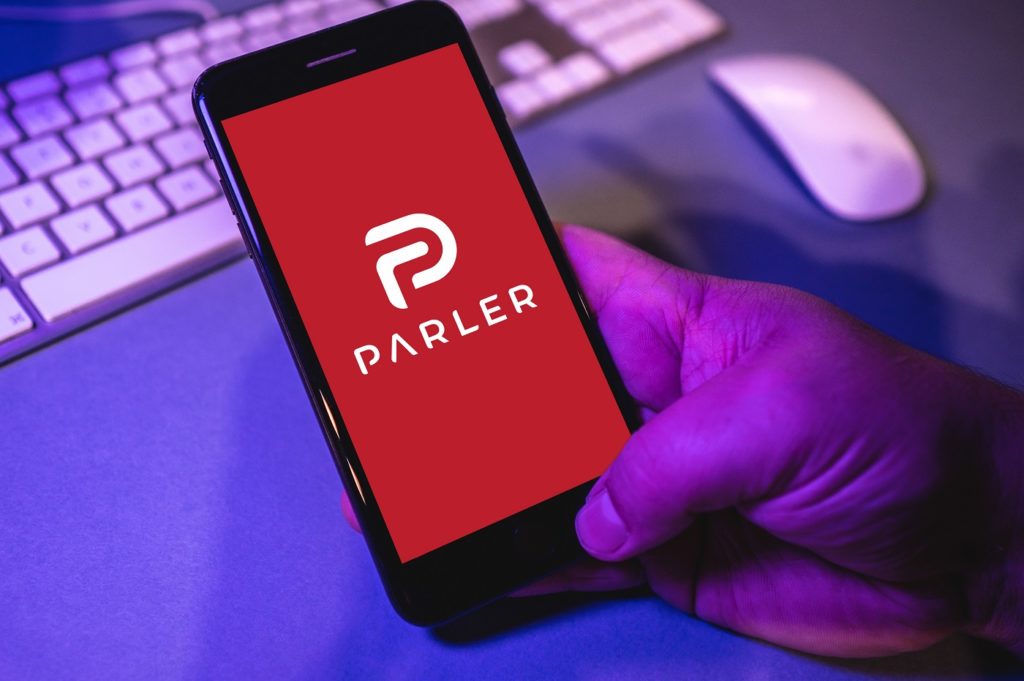The recent “takedown” of Parler by Amazon, Apple, and Google has spurred discussion in technological circles. Do the companies’ actions constitute an abuse of free speech? Or were the tech giants well within their rights, simply enforcing their own “terms of service”? Looking back at the history of free speech in the United States, especially the historical moment during which the right to free speech was codified, can offer guidance.
In 1765, the British Parliament laid the first inland revenue tax on the American colonies through the Stamp Act. This act resulted in larges-scale protests; the colonists held the Parliament had no right to tax people who were not represented in the tax’s drafting, adoption, or implementation.
While the stamp tax was ostensibly meant to pay for troops stationed in the colonies in the wake of the French and Indian War, the act’s purpose went beyond mere revenue generation. At the time, newspapers, books, pamphlets, and broadsheets were critical to spreading information between groups who believed the Crown was mistreating the American Colonies. Under the Stamp Act, all these items would need to be printed on paper obtained exclusively from England, each sheet of which must bear an embossed seal showing the tax had been paid. Printers who disagreed with the Crown’s treatment of the colonies would be forced to pay the Crown for the privilege of saying so. In effect, the government could launder shutting down contrary opinions through the commercial marketplace.
The history of the Stamp Act is crucial in understanding the right to free speech. Does the right to free speech mean the right to free expression, or does it include the right to build or have a platform from which to express yourself? The colonists’ reaction to the Stamp Act reveals the truth. Free speech is not just the right to say something; it is also the right to build and hold the necessary things—the infrastructure—needed to say those things in public.
Start your day with Public Discourse
Sign up and get our daily essays sent straight to your inbox.The view that free speech includes the physical press and distribution is supported throughout American history. For instance, in 1836, President Jackson urged Congress to pass a law forbidding the carrying of “incendiary appeals” through the postal service. A select committee was formed, proposing a law that would forbid the federal government from taking any such steps, but allowing individual states to do so. One congressman, in response, argued liberty of the press entailed “printing as well as the liberty of publishing, in all the ordinary modes of publication.” Thus at least through the War Between the States, freedom of speech included the right to print and distribute material, rather than just “speaking in public.”
In a 2012 article, Eugene Volokh traces the history of the freedom of the press from the pre-constitutional era to the twenty-first century, focusing on both judicial opinions and legal discussions. He concludes that freedom of the press relates to the press as technology rather than as an institution. The freedom to print and distribute material using available technologies is protected for the individual user. This supports the argument that free speech includes the infrastructure required to speak, not just the speech itself.
The Infrastructure of Free Speech
Parliament’s tax on paper to control the colonists’ speech through a public-private partnership has striking parallels to the public-private partnership of government and big tech today. In the 1700s, free speech infrastructure included printing presses, physical places of business, distribution networks, and paper. The rough parallels in the digital world include hosting, reachability, and distribution. These, together, are what is often called “the stack.”
Hosting is the most straightforward component of the stack to understand: the physical servers, software, and storage on which digital services, like web servers, are stored and operated. Even a few years ago, hosting would have been owned and operated by the service itself (on-premises hosting). While many companies still own and operate their networks, the world is rapidly moving toward an outsourced or even utility view of these services. Companies like Amazon (AWS), Microsoft (Azure), and Google (Google Cloud) offer a broad range of hosting services. These cloud services are supposed to be content-neutral. Just as the printing press does not “care” or “know” what is being printed and the telephone company does not monitor and control the conversations flowing over its network, these services are supposed to be very close to commodified.
Reachability is a bit more complex because it consists of multiple components: a name, address, and physical connectivity. In the real world, you might type the name of a coffee shop into your GPS, which returns an address. On the Internet, you type the domain name in the location bar at the top of your web browser, and the Domain Name System (DNS) resolves that name to an address.
Registrars control these domain names. If a registrar decides to take away your name, it will no longer resolve (or it will resolve to some other address than your server). Your site will become unreachable for anyone who does not know the actual address of your servers. Taking over a domain name is one way a law enforcement agency can take down a website: taking control of its name makes the site almost impossible to access.
An address on the Internet is much like a physical street address in function, expressed as a set of numbers called the IP address, like 192.0.2.1 or 2001:db8:3e8:100:1. Regional Internet Registries (RIRs) control these addresses, receiving blocks of addresses from the Internet Assigned Numbers Authority, or IANA. If an RIR, or IANA, decides to revoke your IP address, no one can reach your site to see your service, regardless of where it is physically hosted. These addresses must also be advertised to the rest of the internet, so other devices know how to reach your service. This is called routing.
Physical connectivity is just like the road system. If your house (server) does not have any access from the street (a physical connection to a service provider), your service is unreachable to the world. If a service is located on a cloud service, the provider manages hosting, addressing, and routing, while the name is managed separately. A cloud service provider can destroy your service by removing your files or by making your services unreachable from the Internet. Finally, there is distribution, which includes having an application in widely used app stores, such as those run by Google and Apple. It also includes being indexed in a search engine so that people looking for your service can find it.
If free speech includes the printing press, the paper, the place of business, and the distribution channel for papers, it must also include the entire stack needed to build and run a service on the Internet. Allowing someone to stand on the corner and shout just is not enough to claim you are “protecting free speech.”
If free speech includes the printing press, the paper, the place of business, and the distribution channel for papers, it must also include the entire stack needed to build and run a service on the Internet.
The Takedown of Parler
The recent takedown of alternative social media service Parler is a compelling example of attacking the stack to quell speech. Parler was first attacked by removing the service’s distribution when Apple and Google removed the service from their app stores. Those who use standard web browsers to access the service would still reach and use Parler, but not having an app prevents a broad swath of less technically inclined users from accessing the service.
Just removing the app from distribution, however, was not enough for Parler’s detractors. Amazon then removed Parler from its servers entirely. Amazon could have removed the IP addresses of Parler’s servers, making them unreachable. According to some sources, however, Amazon went further than this, intentionally facilitating attacks against Parler’s resources in an attempt to destroy or discredit the service permanently.
Attacks on the stack do not stop here, however. There are calls within the internet community to attack reachability and naming, as well—to deny reachability to sites like Parler and to cut off name (DNS) resolution for sites that host “controversial material.” These attacks against online services’ infrastructure are the moral equivalent of destroying a printer’s presses, denying the printer access to paper, or even attacking the newsboy hawking the paper in the streets because you disagree with what the printer is printing. Given the Stamp Act’s logic, these are all attacks on free speech itself and dangerous to the American republic. The stack should be sacrosanct.
Do Private Companies Have to Respect Free Speech?
What about the “private company” argument? Amazon is a private company, many reason, so its owners can host whatever content they like and remove whatever they do not. This argument is sound on its face, but there are confounding factors to consider. Constructing a parallel situation with a physical press will help bring these factors into view.
In some alternate universe, suppose there is no internet, and physical publishing is still the primary way information is disseminated through American society. One company decides to specialize in the printing process, opening a series of large-scale printing presses and renting them out.
Customers bring the contents, editorial work, and other elements needed to print their product to this centralized production facility, using the presses to complete their work. This printing mega-company grows large enough to essentially control the supply of paper to the entire printing industry, including any remaining smaller printers, especially when working in concert with two or three prominent companies that control most advertising.
A customer rents a printing press and proceeds to print some controversial work. Can the printing company refuse to serve this customer? According to the “private company” argument, the answer must be “yes.”
But if this “mega-printing” company truly controls most of the technology required to print anything, and can essentially control the flow of printing supplies, and can—finally—largely control the dissemination of printed materials working with a few other like-minded companies, is speech truly free any longer?
Because Amazon, Apple, and Google have a controlling share of the modern-day equivalent of “printing technology,” they represent a severe threat to free speech. Unfortunately, although some of the founders were concerned about the power of monopolies, the Constitution does not address the situation we face today, nor does it tell us how to resolve conflicts between the rights of private corporations and the need to protect free speech. Legislators and judges are still debating whether and how to apply anti-trust legislation to big tech companies.
Because Amazon, Apple, and Google have a controlling share of the modern-day equivalent of “printing technology,” they represent a severe threat to free speech.
Unite to Protect the Stack
In the meantime, what can be done?
Financially, individuals and companies can find and support alternate platforms, even if only for the sake of diversity. If you own a company, insist on diverse infrastructure—and seriously consider maintaining on-premises infrastructure instead of moving everything to the cloud. There are many ways to work against the continued centralization of the Internet.
Politically, the fight should come from both the left and the right—from the American Civil Liberties Union to the Heritage Foundation. Supporting organizations like the Electronic Frontier Foundation, which are already engaged in the fight for digital rights, can also be helpful.
Social media services banning individual accounts and groups is an affront to free speech, but the takedown of Parler is another level of attack. This attack might not be destroying physical presses, but the result—denying the use of the technology required for free speech—is the same. This should not be acceptable in the United States. Protecting the stack is not a matter of liberal or conservative politics but core American freedoms. There is no reason the left and the right should not come together on this one, working together to stop this kind of censorship dead in its tracks.














